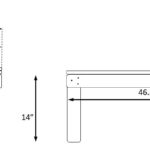This post is building off a previous analysis that showed that it may be beneficial to include a few different countries’ major companies’ stocks in your investment portfolio.
An exchange-traded fund or ETF allows you purchase a small part of many companies. Two common ones are VTI, which is Vanguard Total Stock Market and VOO which is Vanguard S&P 500 ETFs. They have low expense ratios of 0.03%. Compare that to the actively managed funds which can have expense ratios greater than 1%. The lower the expense ratio, the more money goes home with you.
There is one item that should be noted about investing in foreign companies. We also need to keep in mind the currency which the company uses and how strong it is in relation to the USD. For example, the company’s share price may increase, but if the USD gets stronger during this period, it will eat away at your gains.
There are two great websites that let you search ETF’s by your given criteria:
http://www.etf.com/
etfdb.com and their Country Exposure Tool
Browsing these websites, we can see a ETFs that have exposure to the countries. A few countries (Burma, Libya, Romania, Ethiopia, and Iran) that I ranked highly did not have any exposure on the etfdb.com exposure tool. Other countries (Macau and Bangladesh) had very limited exposure in the ETFs. Other countries such as China, Philippines, India, Hong Kong, and Turkey had ETFs with a high amount of exposure. I did a few permutations with different weighting and added South Korea to the list. A table that shows the ETF, expense ratio, and exposure to each country is shown below.
| ETF Ticker |
ETF Name |
Exp Rat (%) |
Macau (%) |
Turkey (%) |
China (%) |
Bangladesh (%) |
Philippines (%) |
India (%) |
Hong Kong (%) |
S Korea (%) |
sum (%) |
No of countries |
| FLKR |
Franklin FTSE South Korea ETF |
0.19 |
|
|
|
|
|
|
|
100 |
100 |
1 |
| EPHE |
iShares MSCI Philippines ETF |
0.59 |
|
|
|
|
99.52 |
|
|
|
99.52 |
|
| TUR |
iShares MSCI Turkey ETF |
0.59 |
|
100 |
|
|
|
|
|
|
100 |
1 |
| FLCH |
Franklin FTSE China ETF |
0.19 |
|
|
16.78 |
|
|
|
82.73 |
|
99.51 |
2 |
| FLHK |
Franklin FTSE Hong Kong ETF |
0.09 |
0.4 |
|
|
|
|
|
95.55 |
|
95.95 |
2 |
| AIA |
iShares Asia 50 ETF |
0.5 |
|
|
|
|
|
|
53.68 |
22.67 |
76.35 |
2 |
| FLAX |
Franklin FTSE Asia ex Japan ETF |
0.19 |
|
|
6.89 |
|
1.15 |
10.29 |
43.71 |
13.02 |
75.06 |
5 |
| GMF |
SPDR S&P Emerging Asia Pacific |
0.49 |
|
|
13.41 |
|
1.56 |
16.2 |
39.73 |
|
70.9 |
4 |
| EMCG |
WisdomTree Emerging Markets Consumer Growth Fund |
0.32 |
|
|
9.53 |
|
3.7 |
8.7 |
21.88 |
11.53 |
55.34 |
5 |
| IEMG |
iShares Core MSCI Emerging Markets ETF |
0.14 |
|
|
6.38 |
|
|
9.11 |
27.78 |
11.86 |
55.13 |
4 |
| ESGE |
iShares ESG MSCI EM ETF |
0.25 |
|
|
4.85 |
|
|
8.95 |
28.44 |
11.55 |
53.79 |
4 |
| SPEM |
SPDR Portfolio Emerging Markets ETF |
0.11 |
|
|
9.42 |
|
|
11.06 |
29.8 |
|
50.28 |
3 |
| VWO |
Vanguard FTSE Emerging Markets ETF |
0.1 |
|
|
8.82 |
|
|
10.12 |
30.58 |
|
49.52 |
3 |
| EEMV |
iShares Edge MSCI Min Vol Emerging Markets ETF |
0.68 |
|
|
8.95 |
|
2.6 |
8.73 |
20.18 |
6.5 |
46.96 |
5 |
| AAXJ |
iShares MSCI All Country Asia ex Japan ETF |
0.72 |
|
|
7.98 |
|
1.02 |
9.84 |
4..5 |
13.17 |
32.01 |
4 |
| VPL |
Vanguard FTSE Pacific ETF |
0.1 |
|
|
|
|
|
|
8.07 |
11.35 |
19.42 |
2 |
| VSGX |
ESG International Stock ETF |
0.17 |
|
|
|
|
|
|
10.74 |
3.28 |
14.02 |
2 |
| VXUS |
Vanguard Total International Stock ETF |
0.08 |
|
|
|
|
|
|
9.78 |
3.19 |
12.97 |
2 |
| FM |
iShares MSCI Frontier 100 ETF |
0.79 |
|
|
|
5.28 |
|
|
|
|
5.28 |
1 |
| XCEM |
Columbia EM Core ex-China ETF |
0.16 |
|
|
|
|
|
|
|
|
0 |
0 |
As we can see, there are quite a few ETFs that have almost 100% exposure for individual countries, but these should be used sparingly because their 0.59% expense ratios. A combination of FLAX, TUR, and FM would get us a mixture that is pretty close to the countries that are the top of the list.
Let’s dive into FLAX for example; you should do this with the other ETFs as well. According to ETF.com, FLAX is mostly technology (34.91%) and financials (29.16%). The top holdings are Alibaba Group Holding (7.69%), Tencent Holdings (6.50%), and Taiwan Semiconductor (5.10%). We should to an assessment of the major companies in each ETF; I will break down Alibaba. You should look at the past few years of annual reports and a few quarterly reports. Looking at the 2019 annual report, the company settled a lawsuit in the USA, which left it in an unfavorable position. However, the company reports a 51% year over year increase in revenue and 242% increase in earnings per share. The company does not report carrying debt. It has has many years of growing revenues.
This is just on example of and ETF you can buy. You can select your own to meet your investment goals.
This article is for informational purposes only. It does not serve as investment advice or credit analysis. It should not be used as a recommendation to purchase any investments.
Disclaimer: I/we have positions in FLAX and Alibaba.
 Instead, I would recommend registering your domain though
Instead, I would recommend registering your domain though 





























